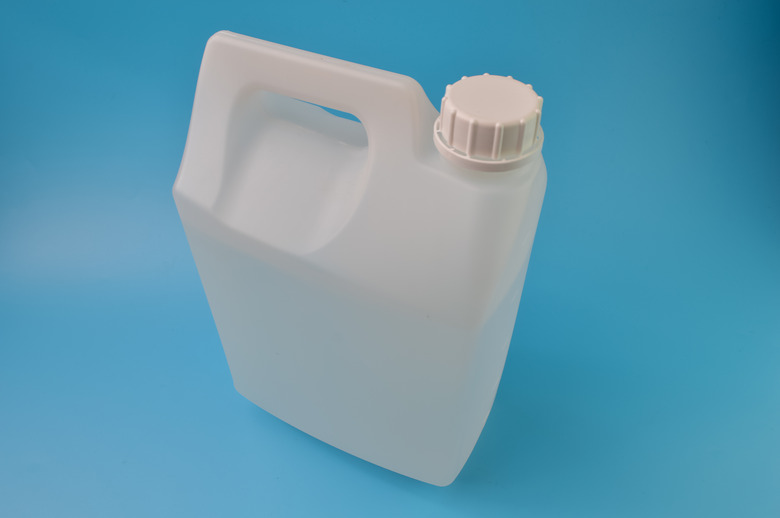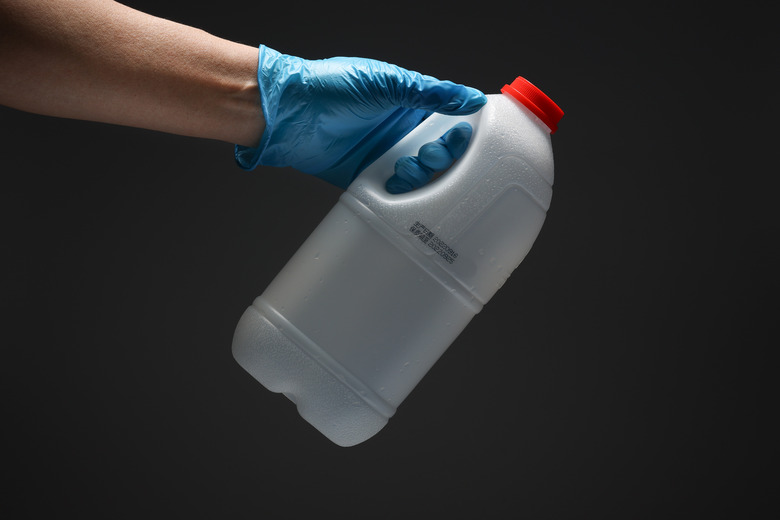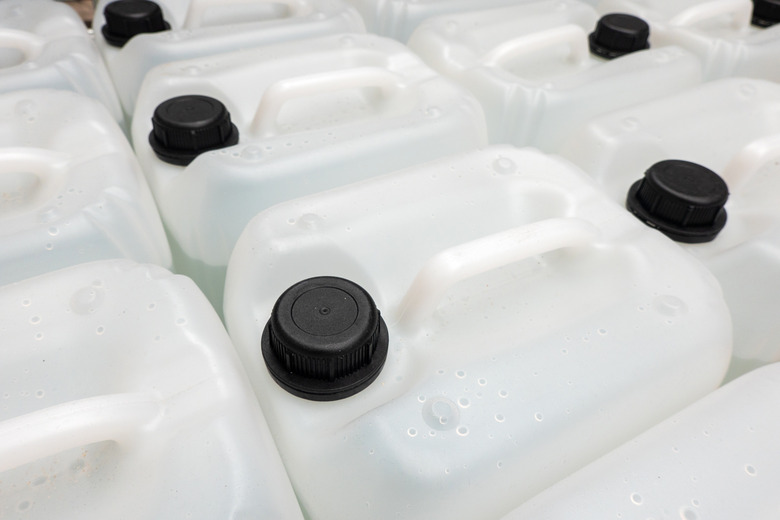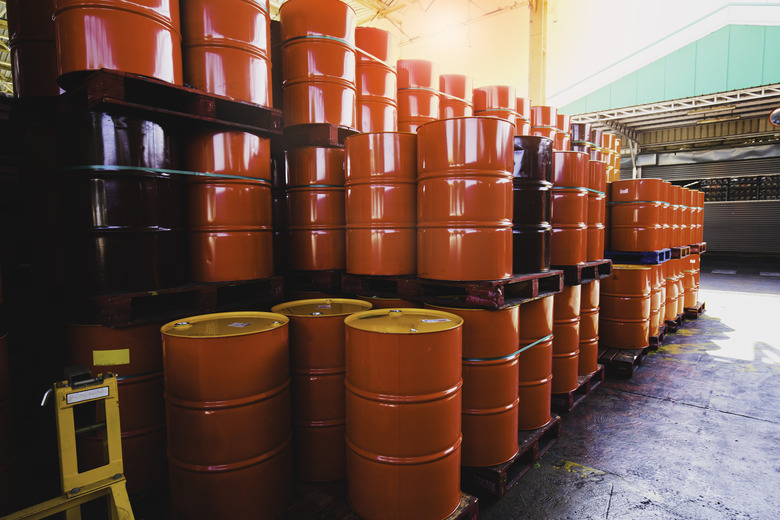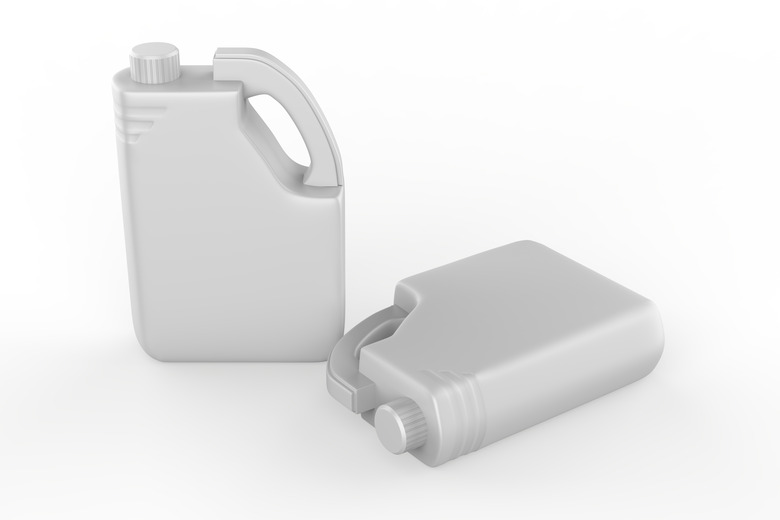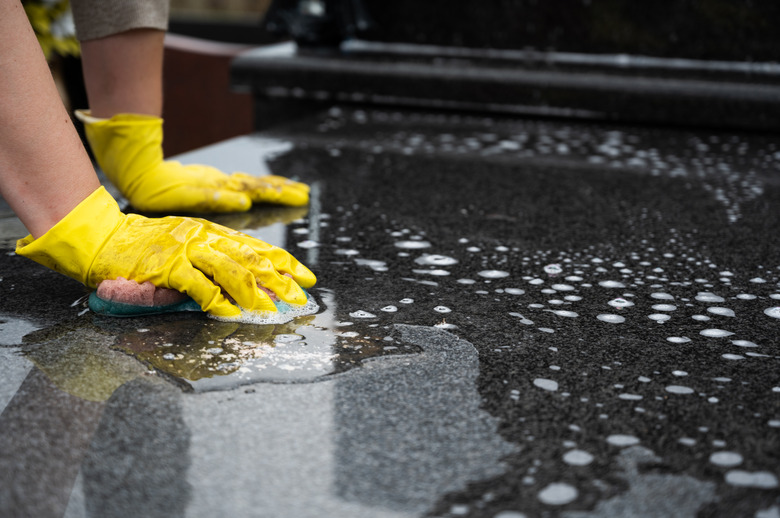How To Dispose Of Muriatic Acid
We may receive a commission on purchases made from links.
Muriatic acid is a cleaning product containing highly corrosive hydrochloric acid (HCl). It is typically used only as a last resort because it is so caustic and toxic — so much so that the issue of how to dispose of muriatic acid is a serious problem for those who purchase it. Still, it can work wonders for tackling difficult jobs, like cleaning rust from concrete, removing efflorescence (salt deposits) on rocks and bricks, and stripping away serious scale buildup in toilets and pools and on tile. Muriatic acid is also commonly used by swimming pool owners to adjust the pH levels of the water when the chlorine content is too high.
When you have muriatic acid in your home, you need to know how to dispose of the chemical safely to avoid injuring humans or animals and to prevent damage to your home and garden as well as the environment. While small quantities of neutralized muriatic acid can be poured down the drain, large amounts of this chemical should be recycled at your local recycling center or hazardous waste facility.
Warning
Because muriatic acid is so hazardous, practice extreme caution and follow all recommended safety precautions when handling and disposing of this chemical. Always wear a respirator or use muriatic acid in a well-ventilated area to prevent the hydrogen chloride vapors it emits from harming your respiratory tract. Wear long sleeves, pants, acid-resistant rubber gloves, and safety goggles whenever you handle this caustic chemical to protect your skin and eyes from splashes. If you get muriatic acid on your skin, immediately flush the area with clean water for 15 minutes and seek medical attention.
Can You Pour Muriatic Acid Down the Drain?
Can You Pour Muriatic Acid Down the
Drain?
Never pour full-strength muriatic acid down the drain, as it can damage your pipes. When properly diluted or neutralized, you can safely dispose of muriatic acid by pouring it down the drain as long as it is connected to the city sewage system — not if your home uses a septic tank, as the acid can damage the good bacteria that break down waste in these systems.
Disposing of muriatic acid down the drain is a good option only when dealing with small amounts of the chemical. Large quantities should be taken to a hazardous waste disposal facility for recycling.
How to Dilute Muriatic Acid
Diluting muriatic acid with water will weaken the acid and allow you to safely pour it down the drain. Here's how to dilute muriatic acid for disposal:
- Pour 3 gallons of water into a large HDPE plastic bucket.
- Slowly add 1/4 cup of muriatic acid, taking care not to
splash. - Stir well using a wooden paint stir stick. Once it's stirred, it's safe to pour down the drain. But make sure to check your local municipal regulations to make sure it's not prohibited before moving forward.
- Pour the diluted muriatic acid down the drain.
Warning
Always pour muriatic acid into water; never add water to acid, as this can result in an exothermic reaction and cause an explosion.
How to Neutralize Muriatic Acid
Neutralizing the chemical before pouring it down the drain is often the best option when it comes to how to dispose of muriatic acid left over from a project. While you can neutralize the acid by mixing it with a base, avoid combining it with alkaline cleaning products, such as chlorine bleach, as this produces toxic chlorine gas. Instead, use a mild alkaline substance, such as baking soda. Here's how to use baking soda to neutralize muriatic acid for disposal:
- Pour 5 1/2 cups of baking soda and 3 1/2
gallons of water into a large HDPE plastic bucket and mix well with a wooden stir
stick. - Add 1/4 gallon of acid, pouring slowly enough to ensure the resulting fizz
does not spill over the edge of the bucket. - Wait for the solution to stop
fizzing, which should take about five minutes. - When the fizzing stops, add 1 more cup of baking soda. If it starts fizzing again, it needs more baking soda and time to neutralize completelyWait five minutes and then add another cup of baking soda to test the reaction.
- When no more fizz rises up after baking soda is added, the acid is completely neutralized and can be safely disposed of.
Can You Dump Muriatic Acid Outside?
Can You Dump Muriatic Acid Outside?
It is never a good idea to dump muriatic acid outside. At its full strength, it can kill plants, pollute groundwater, poison animals, and kill off beneficial microorganisms in the soil, rendering the soil infertile.
When working with muriatic acid outdoors, spray down all nearby soil and plants to protect them from splashing while you work. If you splash the acid on soil or plants, pour baking soda or garden lime on the contaminated area to neutralize the acid. Rinse the area well to dilute any remaining acid. Even with quick action, plants exposed to muriatic acid will usually die back at least a little. Still, you may save much of your vegetation by immediately neutralizing and diluting the chemical.
Be sure to fully neutralize the acid as soon as you are finished working with it and then thoroughly rinse the surface where it was applied. Also rinse any surrounding areas that may have been exposed to runoff to further dilute any unneutralized acid.
Never dispose of muriatic acid in a storm drain, as this water is left untreated before flowing into streams, rivers, and other waterways. If released in the storm drain, the acid may harm plants, animals, and microorganisms residing in these areas.
Can You Recycle Muriatic Acid?
Can You Recycle Muriatic Acid?
Muriatic acid and its containers cannot be thrown away in the trash. Doing so can expose sanitation workers to caustic chemicals, cause dangerous chemical reactions in the garbage truck, and contaminate groundwater underneath landfills.
If you're wondering how to dispose of muriatic acid when you can't just throw away this hazardous material, the good news is that this chemical is recyclable. One of the simplest options for disposing of it is to bring it to your local hazardous waste disposal facility, where it will be processed in the most environmentally friendly way possible. In many cases, these facilities will even pick up the chemical from your home.
Alternatively, contact your local wastewater treatment facility to see if it can use your excess muriatic acid because this product is frequently used for water treatment. You can also ask your local recycling facility, as it may also have environmentally friendly disposal methods.
To dispose of empty containers, first make sure the container is completely empty. Then, rinse it in your sink to dilute any remaining traces of the chemical. Bring the empty container to your local recycling facility so it can dispose of the container in a safe way.
How to Store Muriatic Acid Safely
How to Store Muriatic Acid Safely
It is always best to store muriatic acid in its original container. However, if you need to change containers, transfer the acid to a tight-sealing glass or acid-resistant plastic container. Acid-safe plastic types include HDPE, LDPE, and PTFE. Do not store muriatic acid in ABS or polypropylene plastic bottles, as these are unsafe for storing corrosive acids and can leak. Mark the container so it clearly identifies the dangerous acid, and store it in a safe place that is cool, well ventilated, dark, and dry.
How to Use Up Muriatic Acid
How to Use Up Muriatic Acid
Often, the best way to dispose of muriatic acid is to simply use up the entire bottle. If you have a little extra acid left over after your project, here are some common household uses for this potent chemical:
- Balancing pool pH levels: You can use muriatic acid to lower
the pH level of your pool when you've added too much chlorine. Often, it takes no more than a quart of acid to adjust the pH for an average-size swimming pool. - Cleaning pool filter cartridges: Soaking your filter in a diluted muriatic acid solution for about an hour will strip
away nearly all dirt and debris. - Descale pools and toilet bowls: Hard water can leave calcium and
lime buildup on the edges of your pool or toilet bowl. Muriatic acid is an effective descaler that can break down this hard residue in no
time. Avoid using it on vinyl pool liners, though, as it can damage the surface. - Removing stains from concrete: Rust, mold, and other deep-set
stains can be scrubbed from concrete using a diluted muriatic acid solution. - Scrubbing tile grout: Use muriatic acid to clean stains locked deep in your grout. Keep the chemical away from other
surfaces in your bathroom or kitchen that are made from wood, limestone, polished granite, or marble, as it is too corrosive for these materials. - Cleaning stonework: When your stones
or bricks are covered in ugly efflorescence (chalky, white crystals resulting from minerals in water), diluted muriatic acid is just
the thing to scrub them clean. - Etching concrete: The surface of concrete must be
roughened before painting so paint can adhere properly. Muriatic acid can be used to acid-etch the surface, though it is best to use
concrete etching products when working indoors because the acid has such
dangerously toxic fumes.
